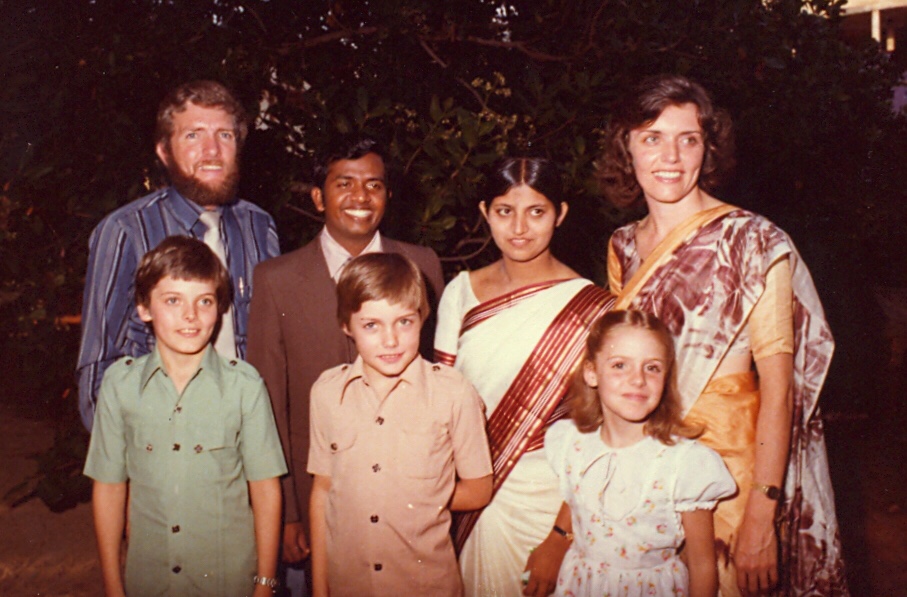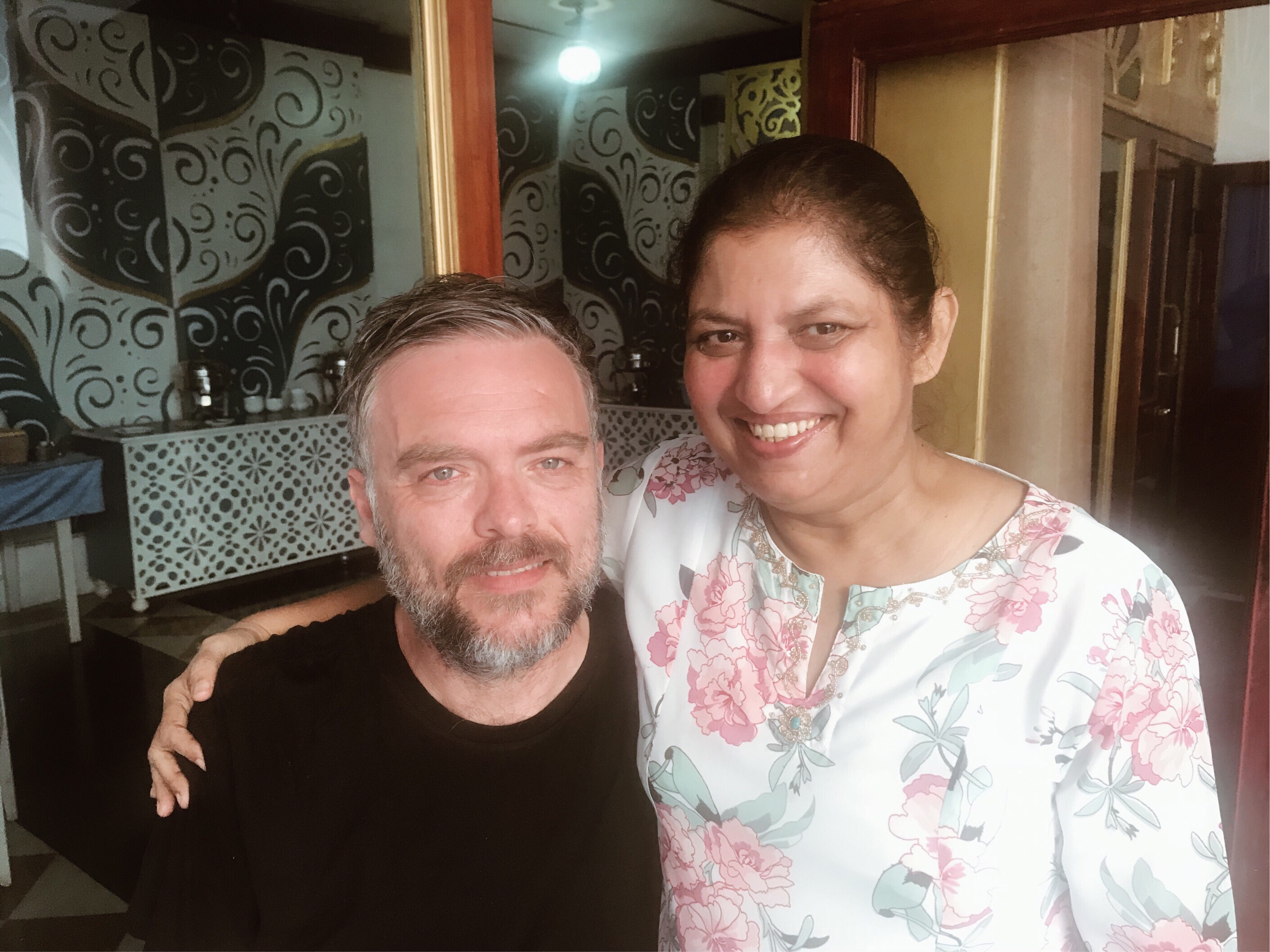Joyce first came into my life when I was nine years old. She married our family friend, Abraham.
I don’t remember a lot about Joyce’s wedding. It was a traditional Christian Indian wedding, a Kerala wedding, an arranged marriage. It carried different traditions to imagery popularised in modern Bollywood culture. But India is India; family, food and celebration is at the heart of all the cultures and sub-cultures here.
On her wedding day, Joyce wore cream. And the ceremony and celebrations were long. And in Malayalam.
 ^ Joyce second from the right with her new husband, Abraham. Yours truly front left.
^ Joyce second from the right with her new husband, Abraham. Yours truly front left.
It was during that period of being shut out due to the language barrier and accumulated boredom that Dad started buying Asterix and Tintin books for us kids. They were available (black market of course) road side and at train stations. 20 rupees was the price back then. In my Adelaide home the tradition continues with my boys now obsessed.
Some time after the wedding, Joyce, along with her appointed intimate stranger, moved with a group of families including our own to Delhi. The church organisation my parents were working with was spreading its wings. The multi-cultural collective rented a two storey house that became home to 14 people; three families and three singles. Amongst that group was Joyce and Abraham. Even within the Australians in the house there were varied backgrounds; English (of the Geoff Boycott variety), Italian, Fijian and traditional Anglo whitey white white. White. You get the drift.
As she reminded us this week, Joyce met Abraham not long before her wedding, her exposure to non-Indians was limited, she spoke no Hindi (being a native Malayali from Kerala), her natural personality was shy, she couldn’t follow the banter, her English was limited and she finds herself in a home with 12 Aussies including several with jostling personalities. Her husband, with his own big presence, had great English, was highly intelligent and in his own way had emerged a scrapper, of the very best kind. He was and remains extremely savvy with people; the kind of person to sum up a room and know how to show just the right part of his personality to any group he needs to communicate with.
The point being – he was fine, more than that, he thrived. Joyce was the outlier.
And I am embarrassed to say the cultural integration warriors in the home chose a western diet as its staple, forcing Joyce to learn how to eat, amongst other delicacies, steamed boiled potatoes. Hmmm … let me think. Starchy plain potatoes or Alu Ghobi? I must speak to my mother to find out who engineered that cracking piece of bilateral genius.
As a child I loved Indian food, I still do. The only exception was boarding school where a bastardised version of Indian food was served a couple of times a week. It was all compromise with truly no winners. In fact I guess it had its own cultural identity, it probably needs a name. How about sh$te. I guess it was food-tease as there was just enough India in it to remind you of what you were missing. But truly, a horrible substitute. More on that later.
My reconnection with Joyce this week has been life-affirming. She reminded me that as as an eleven year old I used to sit with her and explain jokes she had missed, including English colloquialisms and expressions. I had completely forgotten I was her cultural interpreter.
In that story I am reminded of Parker J Palmer’s vocational book Let Your Life Speak. In it he tells the story of a book about aeroplanes he meticulously crafted as a boy, driven by his admiration of the commercial pilot with his accompanying toys who lived next door. Later on Parker tried to become a pilot and was unsuccessful. I guess those in mentoring roles around him missed the point – his creativity was in the making and writing of the book, the pilot and plane thing just happened to be the subject matter. In a vocational sense Parker subsequently fumbled through life until his early 50’s, when he eventually published the first of what has become a huge body of work.
I guess the point is – look at the kids in your life and what they’re drawn to in the years before adolescence. Make some notes. Arguably during that period they will have the most uninhibited connection to the truest version of themselves, ever. Before they go to war with themselves as teenagers.
Back to Joyce. This week we have hung out for a couple of days in Jaipur, it’s been so good.
 ^ Joyce and I reconnect
^ Joyce and I reconnect
Since that small beginning in Delhi in 1980, the organisation that started with a collective of 14 in a house now comprises thousands of churches and community leaders, orphanages, acquisition of several major properties and a ton of smaller regional properties, feeding and education programs including a certified engineering school that is home to hundreds of students. And there would be a bunch more I’m not across yet. To be honest in this metric and data obsessed world I couldn’t give a rip about the specific numbers. Let’s just say big, huge, mega, lots, heaps, stacks.
The growth is staggering. In Adelaide we’ve … [insert what has happened in Adelaide since 1980]. In Australia it would have made BRW fastest growing lists year in year out for 40 years straight.
As a partner to this growth (in addition to her roles as mother and grandmother), I have had a brief window into how the 2019 Joyce operates. Nothing gets passed her and she has absolute clarity about how events should unfold. This is the case on small details, for example how her home is managed, to larger details of resource allocation and planning for vehicles and drivers we have commandeered.
As I remember the Joyce I used to translate for, I am reminded that the quickest path to personal growth is to find the deepest pool and apply the old sink or swim rule. Then I guess if you find yourself comfortably paddling, find a river with some rapids or currents or something. Somehow in this story these analogies feel tired and inadequate.
Reflecting on my life currently being worked out, these are uncomfortable observations and ensuing thoughts from the vantage and softness of my urbane bubble. The enemy of anything great is good. Good can have a terribly soft underbelly. The lowest hanging fruit is easiest to pick. It also rots first.
These days Joyce carries a new presence that has emerged from a lifetime of consistency and achievement in small and big things. But she is exactly the same person I remember as a child.
It has been wonderful to reconnect.